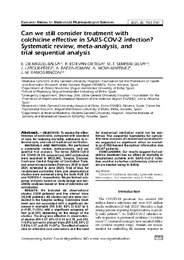Título :
Can we still consider treatment with colchicine effective in SARS-COV-2 infection? Systematic review, meta-analysis, and trial sequential analysis |
Autor :
de Miguel Balsa, Eva 
Estevan Ortega, Raúl 
Sempere, María Teresa 
Latour-Perez, Jaime 
BAEZA-ROMÁN, A.
MOYA-MARTINEZ, A.
Ramos Rincón, José Manuel  |
Editor :
Verduci Editore |
Departamento:
Departamentos de la UMH::Medicina Clínica |
Fecha de publicación:
2021-11 |
URI :
https://hdl.handle.net/11000/38153 |
Resumen :
OBJECTIVE: To assess the effectiveness
of colchicine, compared with standard
of care, for reducing mortality, admission to intensive
care, and use of mechanical ventilation.
MATERIALS AND METHODS: We performed
a systematic review, meta-analysis, and sequential
trial analysis. The terms (SARS-CoV-2
OR COVID-19 OR coronavirus) AND (colchicine)
were searched in MEDLINE, Scopus, Embase,
Cochrane Central Register of Controlled Trials,
and preprint repositories (February 2020 to April
2021, extended to June 2021). Risk of bias for
randomised controlled trials and observational
studies were assessed using the tools RoB 2.0
and ROBINS-I, respectively. We performed subgroup
analyses based on study design and sensitivity
analyses based on time of colchicine administration.
RESULTS: We included six observational
studies (1329 patients) and five clinical trials
(16,048 patients). All studies but one were conducted
in the hospital setting. Colchicine treatment
was not associated with a significant decrease
in mortality (RR 0.93, 95% CI 0.87 to 1;
p=0.06, I2=72%) with a significant subgroup effect
(p<0.001) depending on the design of the
studies. The drug was effective in observational
studies (RR 0.57, 95% CI 0.46 to 0.70, p<0.001,
I2=50%) but not in clinical trials (RR 0.99, 95% CI
0.92 to 1.07, p=0.89, I2=21%). The effect of colchicine
on intensive care admissions and the need for mechanical ventilation could not be confirmed.
Trial sequential boundaries for cumulative
meta-analyses of randomised controlled trials
suggested no significant effect on mortality
(p=0.182) beyond the optimal information size
(13,107 patients).
CONCLUSIONS: Our results suggest that colchicine
treatment has no effect on mortality in
hospitalised patients with SARS-CoV-2 infection,
and that no further confirmatory clinical trials
are needed owing to futility.
|
Palabras clave/Materias:
COVID-19
Colchicine, Mortality
Systematic review
Meta-analysis
Trial sequential analysis
Futility |
Área de conocimiento :
CDU: Ciencias aplicadas: Medicina |
Tipo de documento :
info:eu-repo/semantics/article |
Derechos de acceso:
info:eu-repo/semantics/openAccess
Attribution-NonCommercial-NoDerivatives 4.0 Internacional |
DOI :
https://doi.org/10.26355/eurrev_202111_27269 |
Publicado en:
European review for medical and pharmacological sciences. 2021 Nov;25(22):7151-7161 |
Aparece en las colecciones:
Artículos Medicina Clínica
|

 La licencia se describe como: Atribución-NonComercial-NoDerivada 4.0 Internacional.
La licencia se describe como: Atribución-NonComercial-NoDerivada 4.0 Internacional.
.png)